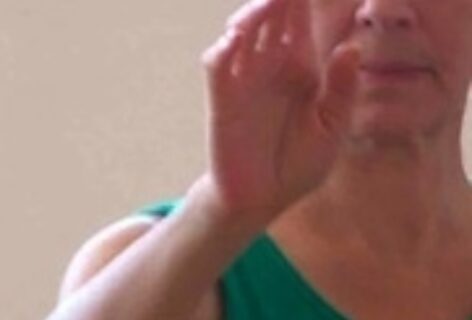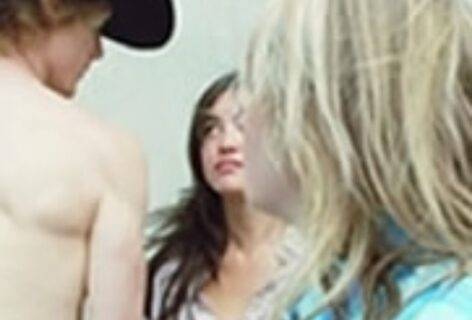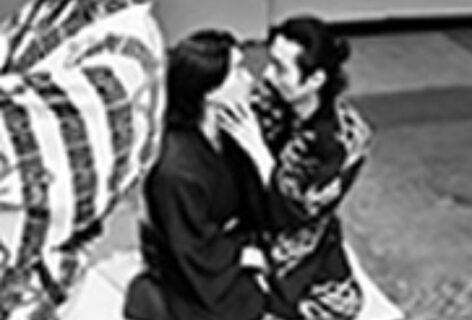Katie Baer Schetlick interviews Jumana Dabis, Amal Khatib and Farah Sale, dancers who she met in Ramallah, Palestine during the Ramallah Contemporary Dance Festival. This is the second in a series of interviews initiated by Schetlick documenting her experience at the festival. Dabas, Khatib and Sale discuss, via Facebook, dancing with Sareyyet Ramallah, a contemporary Palestianian dance group. For more information about dance in Ramallah, please visit www.foundmovements.com.
Thumbnail photo by Ghneim Zarour
Interview date: June – September 2011
Download this conversation as a pdf
Katie Baer Schetlick: What was your relationship to dance before coming to dance with Sareyyet Ramallah? Was it something you did growing up? At home? At celebrations?
Farah Saleh: I took ballet classes in Jordan and Palestine before becoming a member of Sareyyet in January 2003. Then in September 2003 I went to Italy to continue my university career, where I also studied contemporary dance and taught belly dance. I came back to Palestine in November 2009 and again became a member of Sareyyet in April 2010.
Amal Khatib: Before joining Sareyyet, I used to do little dances in summer camps and school and I always liked it but never thought I could do it in Ramallah. I only knew that people join Debke troupes [a Middle Eastern folk dance form] and dance and perform with them and that did not attract me. I liked seeing dance on television, all types of dance that really use all body parts and not like Debke, which is very repetitive. I didn’t like ballet either.
Jumana Dabis: Ever since I was eight years old, dance has encompassed a large component of my daily life. My dance journey began in the Popular Arts Center in Palestine, where I enrolled in the Debke school. As my passion for dance grew, I began to take advantage of every opportunity that presented itself to acquire more advanced dance skills. Our center used to host talented international instructors who trained us in a variety of workshops including ballet, modern, and other styles.
Then I joined the bara’im or youth section of the Palestinian Popular Dance Troupe, whom I performed with in a number of different events throughout Palestine. Upon being accepted into the professional troupe, I was able to build up my experience as we received multiple instructors in different dance styles. I began to experiment with various dance techniques, and started to use dance as a mean of personal expression. I found dance to be the most appropriate tool through which I could express my frustration at the political situation in which my life was embedded. As we prepared for performances, we began to fuse traditional Palestinian dance with contemporary dance in order to tell the story of the Palestinian predicament.
Further into my dance career, while I was part of the steering committee of Dance Alloy, a student-run organization at Earlham College in Indiana, I began to choreograph dances with the aim of conveying the Palestinian experience. My first work was dedicated to Palestinian female prisoners that attempted to convey the true sufferings and vulnerabilities of imprisoned Palestinian women.
Katie: How has the Ramallah Contemporary Dance Festival (RCDF) changed the dance scene in Ramallah? Positively or/and negatively?
Farah: It spreads awareness about contemporary dance among the Palestinian audience, gives dancers the chance to see new and very creative things, and also gives them the opportunity to grow artistically through workshops, co-productions and exchanges.
Amal: The people who will say that RCDF affects the dance scene negatively are those who think contemporary dance is against our values. The festival is what made the company grow and it opened opportunities for a huge number of artists to come here. Every year, Ramallah is more familiar with and accepting of dance and more people are now seeing dance as a possible way to earn their living. It is now very normal to find two people discussing a dance performance, film, or anything related to dance seriously, now that more training is available for Palestinian dancers, and we’re more respected from non-dancers.
Katie: Who do you look to for creative inspiration? Any particular companies or choreographers?
Farah: Mainly Alain Platel and Koen Augustijnen from Les Ballets C de la B (Beligum) and lately Akram Khan (UK).
Amal: I like everything that leaves a mark in whoever watches it. I like the movement style of Wim Vandekeybus/Ultima Vez and the intensity of feelings in his performances I think Akram Khan and Sidi Larbi are very smart in how they work, and I am fascinated by the last two performances by Nacera Belaza.
Katie: What do you think dance can do for the community on a local level in Ramallah?
Farah: It can give them a different instrument to get to know themselves better, express their emotions and concepts to the others. It can stir the audience to interpret the performance and create their own concepts!
Amal: It also makes people more open to new ways of expressing themselves, and more aware of the human body and the natural-ness of its movement and thus it helps get rid of some taboos in the society. Also it is making the older generation realize that the new generation has something different to offer and [compels them to] invest efforts in the new generation.
Katie: What do you envision for the future of the troupe?
Farah Saleh: A professional dance company renowned locally, regionally and internationally with an outreach program.
Amal: Hopefully a company that in the far future will get to develop its own dance style and so start to distinguish itself as a contributor to contemporary dance worldwide.
Katie: What do you think dance from Ramallah can do on a global level? Is there a goal to change people’s misconceptions?
Farah: Changing people’s misconceptions is not my priority. I would aim at creating interesting material that conveys concepts and images, and if that helps in giving the audience a different image about Palestinians then great, but the idea is to present respectable art on an international level!
Amal: I agree with Farah, it is not a goal to change people’s misconceptions about Palestine, we dance because we love dancing and we all want dance to be more than just a hobby and that’s why we want to improve dance in Palestine, if we put changing misconceptions as a goal I think we will be limiting ourselves in producing art that only acts as a defender. We are aware that dance is doing it but it is not the aim.
Yaa Samar! Dance Theatre will present Bound by Samar Haddad King, who currently resides in Palestine, at LaGuardia Performing Arts Center, October 21-22, 2011.




